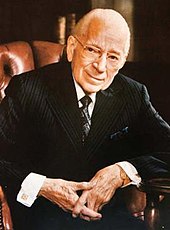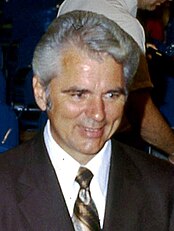
Herbert W. Armstrong was an American evangelist who founded the Worldwide Church of God (WCG). An early pioneer of radio and television evangelism, Armstrong preached what he claimed was the comprehensive combination of doctrines in the entire Bible, in the light of the New Covenant scriptures, which he maintained to be the restored true Gospel. These doctrines and teachings have been referred to as Armstrongism by non-adherents.
Grace Communion International (GCI), formerly named the Radio Church of God and the Worldwide Church of God (WCG), is a Christian denomination based in Charlotte, North Carolina, USA.

The Church of God of Prophecy (COGOP) is a Holiness Pentecostal Christian Church. It is one of six Church of God bodies headquartered in Cleveland, Tennessee, that arose from a small meeting of believers who gathered at the Holiness Church at Camp Creek near the Tennessee/North Carolina border on Saturday, June 13, 1903.
The Living Church of God (LCG) is one of several groups that formed after the death of Herbert W. Armstrong, when major doctrinal changes were occurring in the former Worldwide Church of God (WCG) during the 1990s. It was after its founder, the late Roderick C. Meredith, was fired by board members of the Global Church of God (GCG), that he went on to found, for a second time, a new organization in 1998. It is just one of many and varied Sabbatarian Churches of God groups that have sprung up from the former Worldwide Church of God, known today as Grace Communion International (GCI). The US membership of the LCG is claimed to be around 11,300 with about 5,000 of that total number being claimed international members. From the LCG organization, several additional split-off groups have resulted over the years, each one headed by a former LCG minister.

The Churches of God (Seventh Day) is composed of a number of sabbath-keeping churches, among which the General Conference of the Church of God, or simply CoG7, is the best-known organization. The Churches of God (Seventh Day) observe the Sabbath on Saturday, the seventh day of the week.
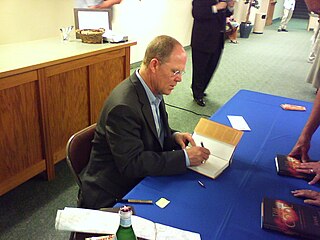
Hendrik "Hank" Hanegraaff, also known as the "Bible Answer Man", is an American Christian author and radio talk-show host. Formerly an evangelical Protestant, he joined the Eastern Orthodox Church in 2017. He is an outspoken figure within the Christian countercult movement, where he has established a reputation for his critiques of non-Christian religions, new religious movements, and cults, as well as heresy in Christianity. He is also an apologist on doctrinal and cultural issues.
The Global Church of God (GCG) is a Sabbatarian church based in England. It was founded in Glendora, CA in 1992 by Roderick C. Meredith. Following the dissolution of most church operations in the United States, GCG's operations shifted to the United Kingdom and reestablished a presence in North America under new organizational identities.
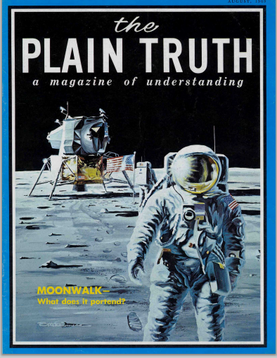
The Plain Truth was a free-of-charge monthly magazine, first published in 1934 by Herbert W. Armstrong, founder of The Radio Church of God, which he later named The Worldwide Church of God (WCG). The magazine, subtitled as The Plain Truth: a magazine of understanding, gradually developed into an international, free-of-charge news magazine, sponsored by the WCG church membership. The magazine's messages often centered on the pseudo-scientific doctrine of British Israelism, the belief that the early inhabitants of the British Isles, and hence their descendants, were actually descendants of the Ten Lost Tribes of Israel.
The Church of God, International (CGI) is a nontrinitarian Christian denomination based in the United States, an offshoot of the Worldwide Church of God (WCG) founded by Herbert W. Armstrong. It is one of many Sabbatarian Churches of God to separate from WCG.
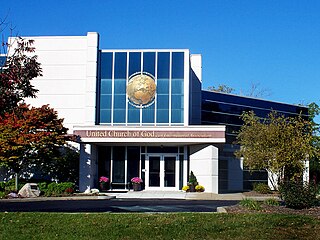
The United Church of God, an International Association is a nontrinitarian Christian church based in the United States.

Joseph W. Tkach was the appointed successor of Herbert W. Armstrong, founder of the Worldwide Church of God. Tkach became president and pastor general of the church upon the death of Armstrong in 1986. Tkach spearheaded a major doctrinal transformation of the Worldwide Church of God, abandoning Armstrong's unconventional doctrines and bringing the church into accord with orthodox evangelical Christianity. His son, Joseph Tkach Jr., continued his work and in 1997 the Worldwide Church of God became a member of the National Association of Evangelicals.

Joseph Tkach Jr. is an American minister and formerly president of Grace Communion International, an evangelical Protestant denomination based in Charlotte, North Carolina. He hosted the weekly web-series Speaking of LIFE.
The theology of the Seventh-day Adventist Church resembles that of Protestant Christianity, combining elements from Lutheran, Wesleyan-Arminian, and Anabaptist branches of Protestantism. Adventists believe in the infallibility of Scripture and teach that salvation comes from grace through faith in Jesus Christ. The 28 fundamental beliefs constitute the church's official doctrinal position.
Beyond Today is a free religious magazine published bimonthly by the United Church of God (UCG). Subscriptions and printing costs are covered by tithed donations from UCG's members and employees. Subject matter includes Christian living, Bible prophecy, warnings to the English-speaking world, social issues, defense of creationism against evolution, world news, and prophecy, as interpreted by UCG's fundamental beliefs. Articles are exclusively written by the church's ministry.
The Philadelphia Church of God (PCG) is a non-trinitarian, sabbatarian church based in Edmond, Oklahoma, US. The PCG is one of several offshoots of the Worldwide Church of God (WCG), founded by Herbert W. Armstrong (1892–1986). The PCG was established by Gerald Flurry with the stated purpose of continuing Armstrong's teachings, which were re-evaluated and subsequently rejected by the WCG after Armstrong's death, as it came to accept orthodox Christian teachings, such as the Trinity. Armstrong had rejected the Trinity doctrine in favor of the view that God is not one but two separate God-beings into which Family, according to Armstrong, "humans upon true conversion and spiritual growth, may be born."
Dwight Leslie Armstrong was an American composer of hymns based upon texts from the Psalms and other books of the Christian Bible. He was the younger brother of Worldwide Church of God (WCG) founder Herbert W. Armstrong, and uncle of American WCG evangelist Garner Ted Armstrong. He was married to Karen Hill Armstrong and was the father of one daughter, Deborah.
The Church of God, Preparing for the Kingdom of God (COG-PKG) is an apocalypticist splinter sect of the Worldwide Church of God (WCG) that claims to provide "support, education and warning" to former members of the WCG. It is one of many groups that left the WCG after its sweeping doctrinal changes in the late 1980s, and forms a part of the seventh-day Sabbatarian Churches of God, following the teachings of the WCG's founder, Herbert W. Armstrong. Headquartered in Cincinnati, Ohio, the COG-PKG is an international church which is mostly active on the Internet. It was founded in 1998 by Ronald Weinland, a former WCG minister.
Historically-speaking, in the former Worldwide Church of God an "evangelist" was a high ranking minister under governance of the Pastor General, Herbert W. Armstrong from 1934 to 1986, then under Joseph W. Tkach, from 1986 until his death in 1995. Higher ranking positions being; "apostle" (first) and then "prophet" (second) as stated in Ephesians 4:11. In the WCG, which was later renamed and is today known as Grace Communion International, the biblical term "evangelist" is no longer used as a ministerial title, although certain denominations with roots in the former WCG organization, such as the Living Church of God and the Philadelphia Church of God, still use the term.
The Restored Church of God (RCG) is one of many churches which were formed in response to major doctrinal changes which were made within the Worldwide Church of God (WCG) in 1995. The RCG claims to retain the tenets, style, and structure which existed in the earlier WCG before church leader Herbert W. Armstrong's death in 1986.
The Pillars of Adventism are landmark doctrines for Seventh-day Adventists. They are Bible doctrines that define who they are as a people of faith; doctrines that are "non-negotiables" in Adventist theology. The Seventh-day Adventist church teaches that these Pillars are needed to prepare the world for the second coming of Jesus Christ, and sees them as a central part of its own mission. Adventists teach that the Seventh-day Adventist Church doctrines were both a continuation of the reformation started in the 16th century and a movement of the end time rising from the Millerites, bringing God's final messages and warnings to the world.
